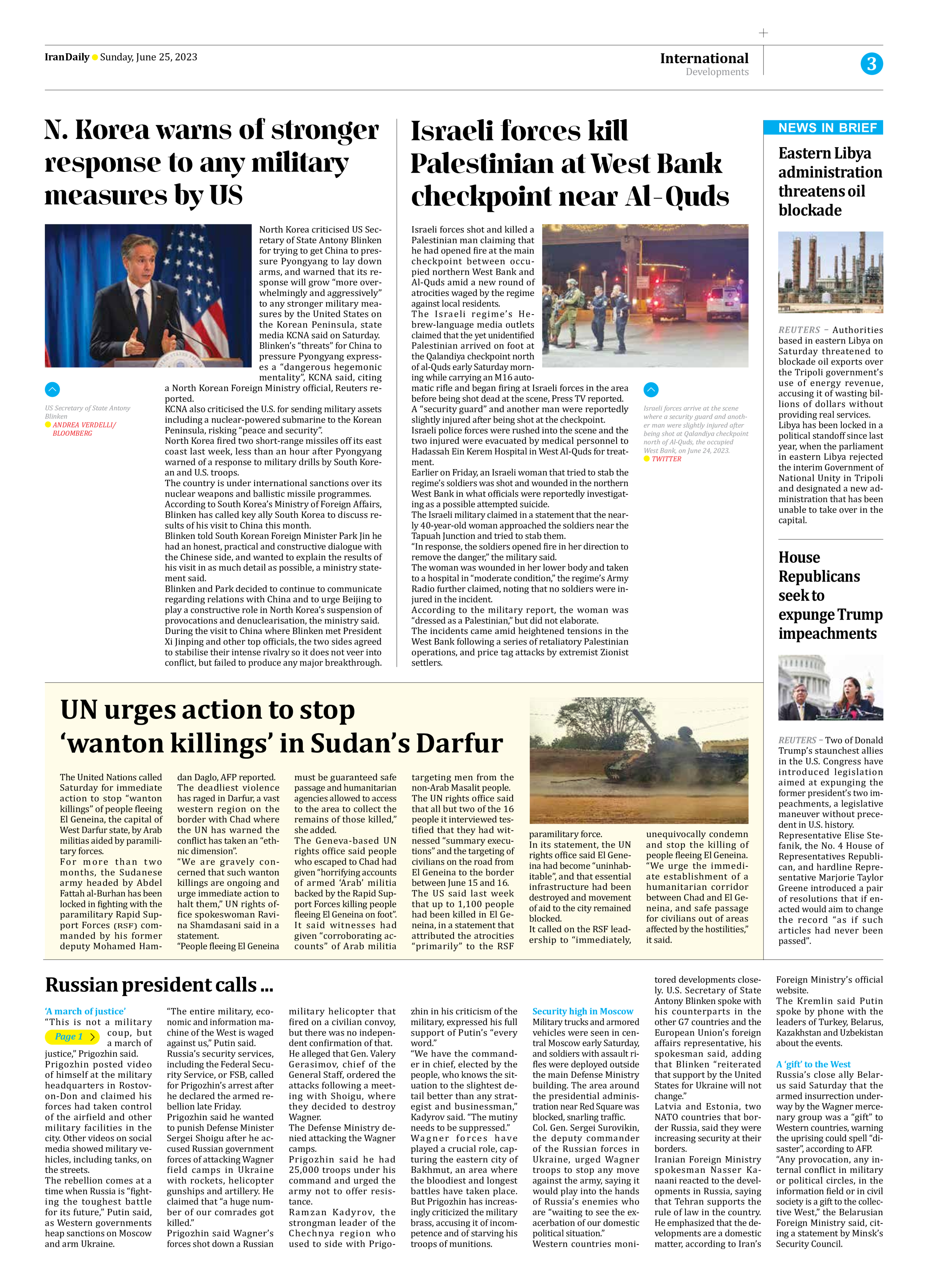
Russian president calls ...
Page 1
‘A march of justice’
“This is not a military coup, but a march of justice,” Prigozhin said.
Prigozhin posted video of himself at the military headquarters in Rostov-on-Don and claimed his forces had taken control of the airfield and other military facilities in the city. Other videos on social media showed military vehicles, including tanks, on the streets.
The rebellion comes at a time when Russia is “fighting the toughest battle for its future,” Putin said, as Western governments heap sanctions on Moscow and arm Ukraine.
“The entire military, economic and information machine of the West is waged against us,” Putin said.
Russia’s security services, including the Federal Security Service, or FSB, called for Prigozhin’s arrest after he declared the armed rebellion late Friday.
Prigozhin said he wanted to punish Defense Minister Sergei Shoigu after he accused Russian government forces of attacking Wagner field camps in Ukraine with rockets, helicopter gunships and artillery. He claimed that “a huge number of our comrades got killed.”
Prigozhin said Wagner’s forces shot down a Russian military helicopter that fired on a civilian convoy, but there was no independent confirmation of that.
He alleged that Gen. Valery Gerasimov, chief of the General Staff, ordered the attacks following a meeting with Shoigu, where they decided to destroy Wagner.
The Defense Ministry denied attacking the Wagner camps.
Prigozhin said he had 25,000 troops under his command and urged the army not to offer resistance.
Ramzan Kadyrov, the strongman leader of the Chechnya region who used to side with Prigozhin in his criticism of the military, expressed his full support of Putin’s “every word.”
“We have the commander in chief, elected by the people, who knows the situation to the slightest detail better than any strategist and businessman,” Kadyrov said. “The mutiny needs to be suppressed.”
Wagner forces have played a crucial role, capturing the eastern city of Bakhmut, an area where the bloodiest and longest battles have taken place. But Prigozhin has increasingly criticized the military brass, accusing it of incompetence and of starving his troops of munitions.
Security high in Moscow
Military trucks and armored vehicles were seen in central Moscow early Saturday, and soldiers with assault rifles were deployed outside the main Defense Ministry building. The area around the presidential administration near Red Square was blocked, snarling traffic.
Col. Gen. Sergei Surovikin, the deputy commander of the Russian forces in Ukraine, urged Wagner troops to stop any move against the army, saying it would play into the hands of Russia’s enemies who are “waiting to see the exacerbation of our domestic political situation.”
Western countries monitored developments closely. U.S. Secretary of State Antony Blinken spoke with his counterparts in the other G7 countries and the European Union’s foreign affairs representative, his spokesman said, adding that Blinken “reiterated that support by the United States for Ukraine will not change.”
Latvia and Estonia, two NATO countries that border Russia, said they were increasing security at their borders.
Iranian Foreign Ministry spokesman Nasser Kanaani reacted to the developments in Russia, saying that Tehran supports the rule of law in the country. He emphasized that the developments are a domestic matter, according to Iran’s Foreign Ministry’s official website.
The Kremlin said Putin spoke by phone with the leaders of Turkey, Belarus, Kazakhstan and Uzbekistan about the events.
A ‘gift’ to the West
Russia’s close ally Belarus said Saturday that the armed insurrection underway by the Wagner mercenary group was a “gift” to Western countries, warning the uprising could spell “disaster”, according to AFP.
“Any provocation, any internal conflict in military or political circles, in the information field or in civil society is a gift to the collective West,” the Belarusian Foreign Ministry said, citing a statement by Minsk’s Security Council.







